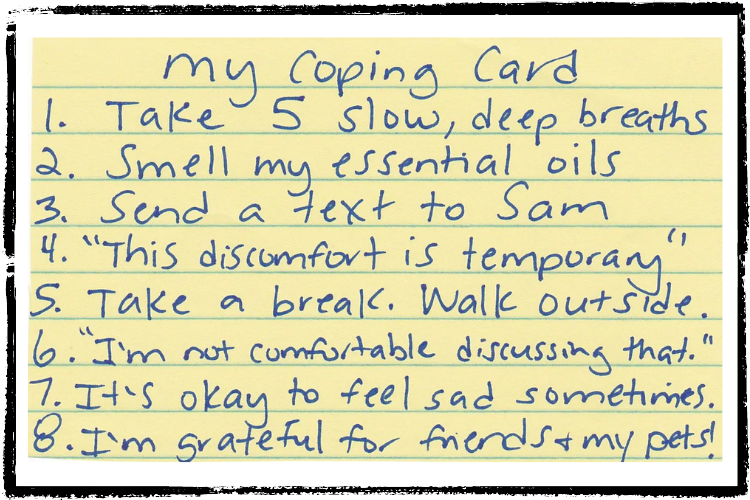By Renata Hill, Moodfuel News
It's that time of year again, what strategies are you putting in place now to survive the holidays when visiting family?
Although winter festivities are meant to bring friends, family and colleagues together, they can produce awkward, uncomfortable encounters. For members of the Lesbian, Gay, Bisexual, Transgender, Queer, Intersex, Asexual, Aromantic and Two-
Spirit + communities (LGBTQ+), there can be an added layer of stress due to the behaviors of unaccepting relatives or people who are under the influence during visits home.
In an article for the Maria Droste Counseling Center, Steven Haden, chief executive officer and co-founder of Envision:You, a Colorado-based, non-profit, LGBTQ+ behavioral health initiative, said he's grateful to be alive and celebrating the holidays. Sixteen years ago he actively struggled with a substance use disorder and depression, making the holidays a chaotic, unhealthy mess. Now, he guards his mental health and sobriety carefully.
Family gatherings can be a minefield, choose your battles
The emphasis on gathering with family, especially if relatives aren't welcoming and supportive, can be rife with unpleasant or downright cruel experiences. Haden said verbal attacks or microaggressions can prevent LGBTQ+ people from being themselves. Worse, some people are not allowed to return home or were kicked out due to their LGBTQ+ identities.
LGBTQ+ people are more likely than other populations to experience loneliness, stress, anxiety and depression throughout the year, but those feelings multiply when going home for holiday visits. OutCoast magazine supplemented this commentary by mentioning some unique stressors facing LGBTQ+ people, including:
- Not being “out” to those with whom you spend time
- You're out, but not fully accepted, especially by close relatives
- Your partner may not be out to their family
- You may be misgendered or subjected to invasive questioning about your sexuality and/or gender identity
- You may experience bisexual erasure and feel invisible even if you've come out.
Overwhelm is normal and common
First, remember that it's normal to feel overwhelmed by the sights, sounds and behaviors of the holidays. Traveling, buying and gifting, dealing with high prices and crowded spaces and meeting others' expectations can be daunting and exhausting.
As a result, said Dr. Anoopinder Singh, a psychiatrist and the regional medical director for Mindpath Health, "This is when many abandon healthy routines, increase their use of alcohol and other substances and compromise their compensatory or coping mechanisms."
Therefore, it's really important to carve out time for self-care. A 15-minute walk, a nap, a cup of peppermint tea in a quiet room or performing some breathing exercises will enable you to connect with your inner calm even if it's very loud and people-y on the other side of that door.
Second, you are not alone! There are supportive people who appreciate you as you and they are no farther away than a phone call, text or chat. Reach out to your chosen family – people who know and love the authentic you – or to warmlines or online support groups.
Meagon Nolasco said she began attending groups at a local pride center to help her find an accepting community that valued her mental health and right to love who she wanted. "When celebrating the holidays, let us be aware of those who are not celebrating ... with their families," she said. "We can try changing those Merry Christmas mass text messages to individual messages of checking in, maybe an anecdote to bring cheer to those who feel less than cheerful."
"Even for those of us who consider ourselves lucky and have allies we also call family and friends," said Aimee Beardslee, a Licensed Mental Health Counselor, LGBTQ+ Affirmative Therapist and owner of Rainbow Counseling, "it’s easy to get wrapped up in the fantasy that the holidays are supposed to be somehow more special than the rest of the year."
Use strategies to bolster the rational part of your brain
Beardslee recommends creating what she calls a "coping card," an easy reminder to carry around for times that become just too much. She likes to use index cards, but a list on your phone works too.

Strategies like this one are empowering because they short-circuit that fight/flight/freeze response orchestrated by the limbic brain. "The primitive part of your brain is attempting to steer your bodies’ actions to keep you safe from harm," said Beardslee, but "if you aren’t faced with a truly life threatening circumstance, the more evolved and 'rational' part of your brain needs to be reminded that it will be okay and you will survive."
Members of the LGBTQ+ community deserve to enjoy and celebrate the holidays with as much gusto as everyone else. Yet, many are confronted with discrimination. Preserve your mental health by planning ahead and practicing self-care. Surrounding yourself with the support you need can go a long way in allowing you to relax, enjoy and survive the holidays.


